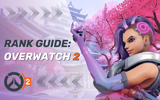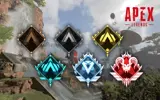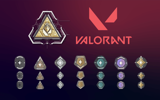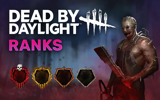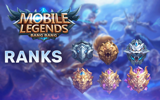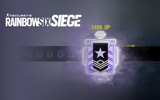How Does Dota 2 Ranking System Work? 🏅
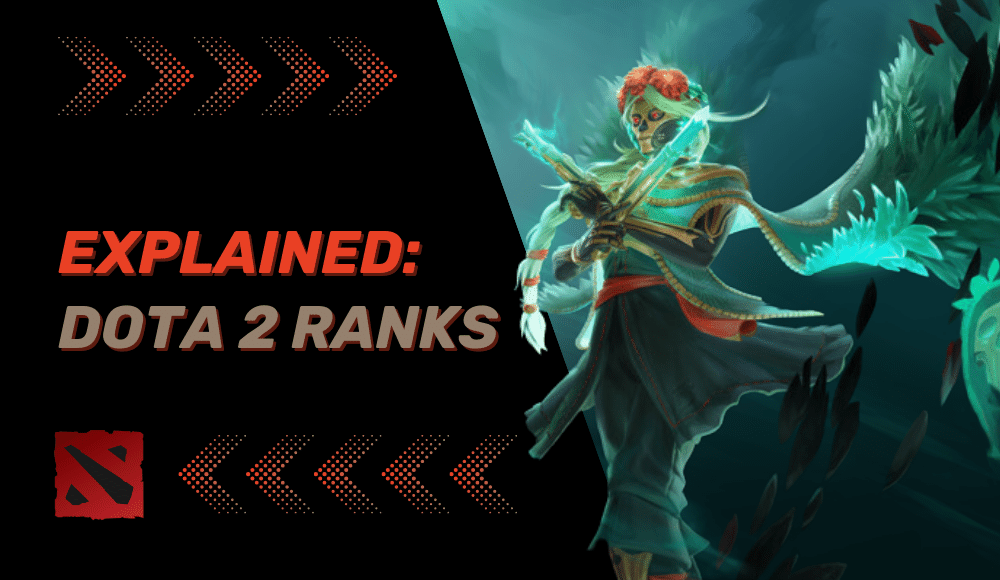
Welcome, fellow gamers! If you're anything like us, you've probably spent countless hours on Dota 2, the fiercely competitive and famously addictive online game that never ceases to ignite our competitive spirits. Whether you're a newbie just starting to dip your toes into the vast world of Dota 2, or a seasoned pro aiming to up your game, there's always something new to learn. Today, we're going to deep dive into the robust Dota 2 ranking system.
How Does Dota 2 Ranks Work?
So, what drives the Dota 2 ranking system? The crucial factor is what's known as MMR. This value, hidden under the hood of your profile, determines how the game perceives your skill level, and thus, who you're matched with during your games. But don’t think of your MMR as being set in stone; it will fluctuate based on your performance in ranked matches.
Although it sounds simple, in reality, the value of Dota 2's ranks is influenced by a bevy of other factors. Your performance during calibration matches, for instance, can greatly affect where you land on the rank ladder. Calibration matches are a series of initial games that the system uses to gauge your skill level, so make these count because the higher you score, the better off you’ll be.
You may think that’s all there is, but here's another twist in the tale. Dota 2 ranks are also separated into Medal tiers and divisions. Most ranks have five divisions, each representing a range of MMR.
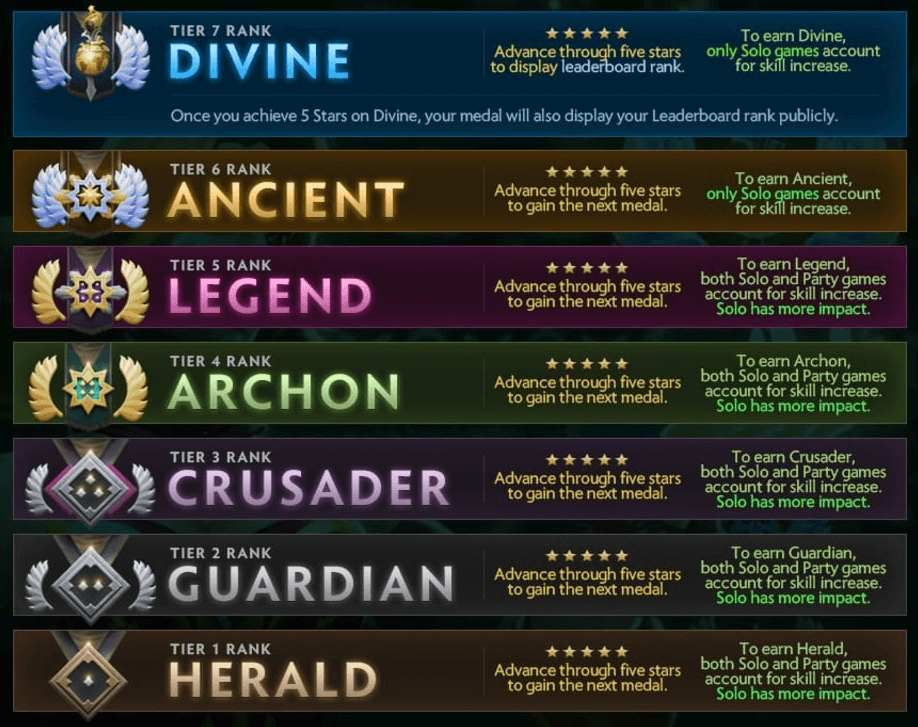
But before we get into the rank tiers and divisions, let's go through what MMR really is.
What is MMR?
MMR, or Match Making Rating, is a numerical value that reflects your performance skill in Dota 2. Simply put, the higher your MMR, the better you are perceived to be at the game. MMR is not only about winning or losing a match; it considers many critical aspects, including your contribution to the team, killing efficiency, and overall impact during the match. Every game you play influences your MMR- a win will increase it, while a loss will decrease it.
Let's delve into the operations behind the scene. Your initial MMR is calculated after you’ve played a certain number of games (calibration phase). Once this initial value is set, MMR changes become increasingly dependent on your win-loss ratio and the MMR of your opponents.
- If you win against opponents with higher MMRs, you'll gain more points, and vice versa.
- If you suffer loss against lower ranked opponents, your MMR will drop more significantly compared to losing against higher ranked opponents.
What makes the system more intricate and exciting is the factor of uncertainty. For example, if you are continuously winning or losing, the system increases the uncertainty factor, allowing for quicker MMR adjustments.
List of All Dota 2 Ranks
Now that we've demystified MMR, it's time to delve into the actual ranks of Dota 2. Each rank represents a unique level of skill, and here they are, listed from lowest to highest:
- Herald
At the Herald rank, players are usually just getting a feel of the game. They carry a basic understanding of the game mechanics, with occasional flashes of brilliance. - Guardian
Guardians might not be experts, but they've left the novice stage behind. They have slowly begun to understand complex mechanics and team strategies. - Crusader
Moving on to Crusaders, these players have developed a respectable understanding of Dota 2's complexities. They venture boldly into advanced strategies and hero pools. - Archon
Archons dwell at a turning point. They boast consistent gameplay with a solid grip on various heroes and understanding of complex game tactics. - Legend
Legend players stand apart with enhanced gaming skills and strategic understanding. They exhibit a strong command of several heroes, mastering the art of manipulation in the Dota 2 world. - Ancient
An Ancient player signifies a refined balance between an advanced understanding of the mechanisms of Dota 2 and the numerous hours spent honing their gaming intuition and skills. - Divine
The Divine rank is a testament to staggering skill and deep comprehension of Dota 2 gameplay. Each player exhibits marked expertise and tactical knowledge gained from countless hours of practice. - Immortal
Finally, the hallowed Immortal rank is reserved for the elites of Dota 2. These players epitomize the pinnacle of gaming expertise, defined by their intricate tactical prowess, exceptional hero flexibility and command over advanced game strategies.
Each rank, except Immortal, consists of five divisions, increasing from I to V.
Remember, the journey to the highest ranks starts at every player's individual pace. Mastery is a product of dedication, patience, and relentless practice. Keep grinding!
How to Rank Up Faster in Dota 2
The journey to the top of the Dota 2 competitive ladder is long, hard, and requires consistent perseverance. But trust us, reaching that coveted Divine or Immortal badge is a milestone, a pinnacle in skill and strategy that is worth every moment of the grind.
As promised, we have jotted down some of the most effective strategies for ranking up quickly in Dota 2. The one thing that stands between you and your next rank badge could merely be a good piece of advice.
- Map Awareness: Keep an eye on both your teammates and enemies' positioning and predict potential ambushes. Knowledge is power, so don't forget to regularly check the mini-map.
- Vision Control: Make sure your team has the vision necessary to make informed decisions. This involves good ward placement to avoid ganks, check Roshan, and scout enemy positions.
- Communication: Build a habit of regularly communicating with your teammates. Simple calls like 'Missing', 'Care', or 'Push' could mean the difference between a winning and bust game.
- Studying Your Replays: Don't just move on to the next game after a loss. Take the time to study your replays, identify mistakes and areas for improvement. Every game is a learning experience.
- Understanding the Meta: The 'Meta' or the Metagame is the current dominant strategy or set of strategies in the game. Being aware of the meta heroes and their counters can play a crucial role in winning matches.
- Objective Gaming: Above all else, remember, Dota 2 is an objective-based game. Prioritise objectives such as tower pushing, securing Roshan over unnecessary ganks, and skirmishes. The primary goal is to destroy the enemy's Ancient.
- Farming Efficiency: There's more to Dota 2's economy than just bagging kills. Efficient farming can mean the difference between an item advantage and being left in the dust.
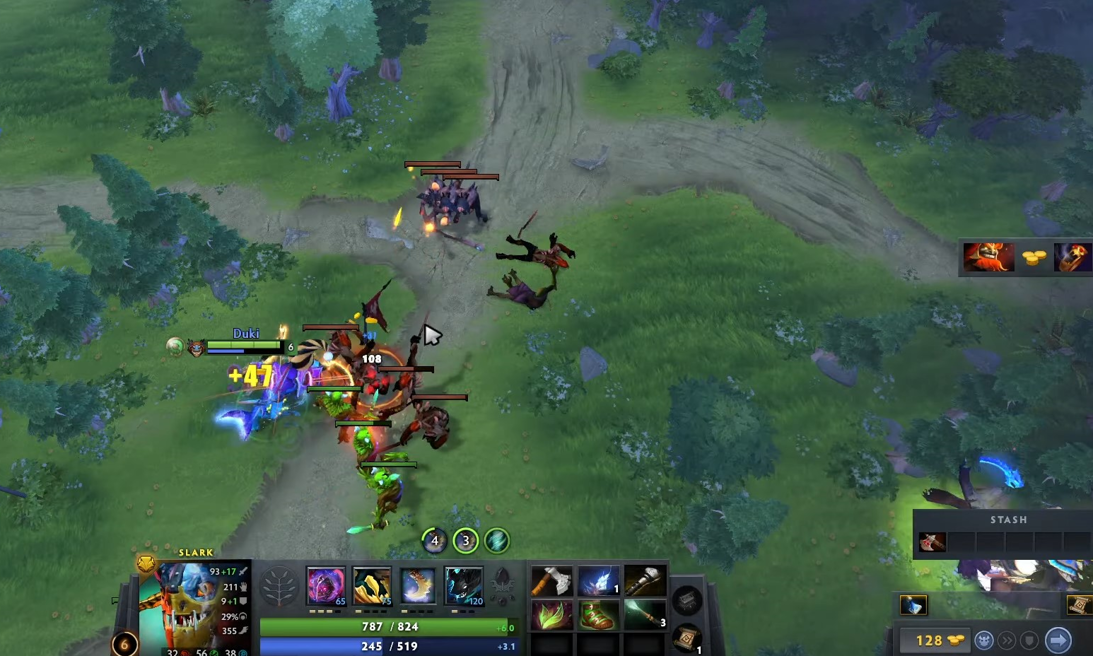
That's about it, folks. We've navigated through the ranks of the Dota 2 competitive play, recognized the types of players that reside within each rank valley, and shed some light on the path towards rank advancement. It's your game field now, equipped with this rich knowledge of ranks.
Keep in mind, the key to ranking up isn't solely about grinding games. It's understanding where you are, acknowledging what you need to do to improve, and then taking actionable steps towards that improvement. Dota 2 is a game of strategy, skill, teamwork, and, above all, continuous learning.


